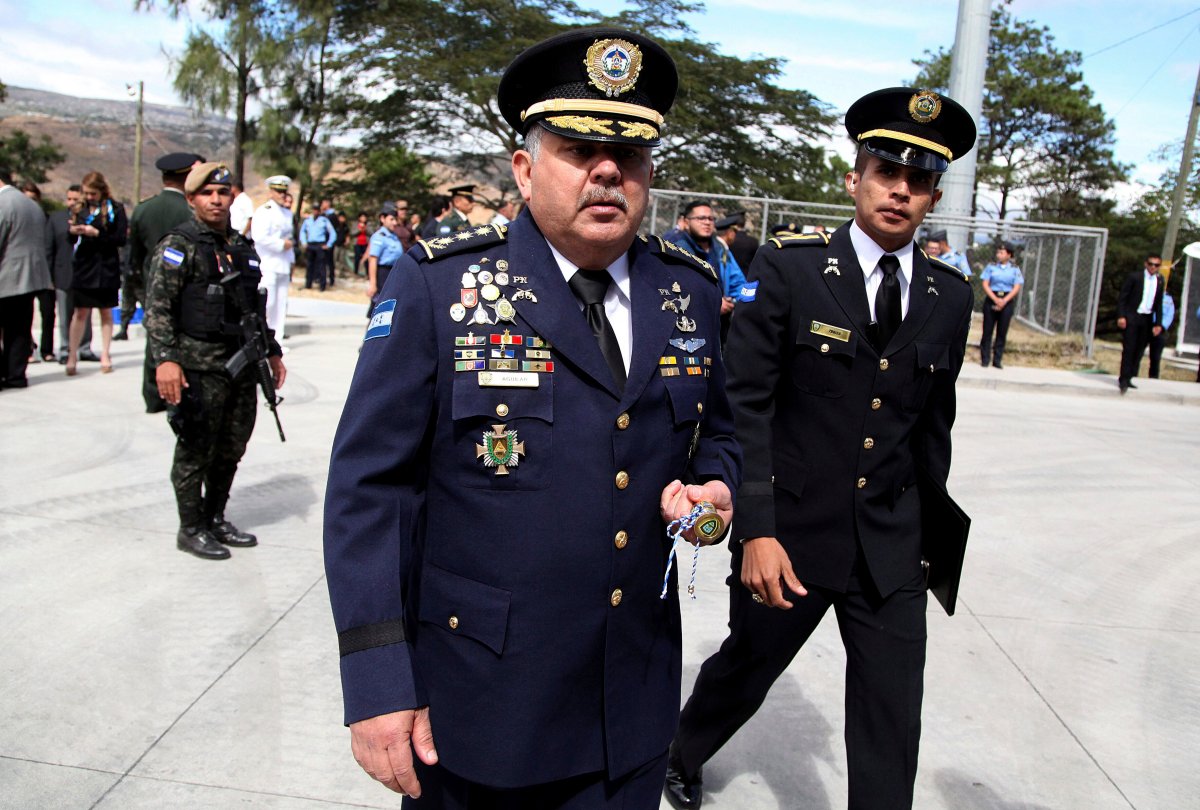MEXICO CITY – The newly appointed national police chief in Honduras, a key ally in the U.S. war on drugs, helped a cartel leader pull off the delivery of nearly a ton of cocaine, according to a confidential security report obtained by the Associated Press.

Chief Jose David Aguilar Moran, who was sworn in last week, called off local cops who had just busted a truckload of cocaine escorted by police officers in 2013, the report says. Aguilar, who was working his way up department ranks at the time, ordered the lower-level officers to let the drugs and cops go, which they did. The U.S. street value of the cocaine involved could have topped $20 million.
Cartel boss Wilter Blanco, who was running the drugs, was later caught with another cocaine load, extradited to the U.S. and is now serving a 20-year sentence in U.S. prison.
But Chief Aguilar’s involvement, documented in an internal report, was never publicly reported. And last week, in a solemn ceremony, Honduran President Juan Orlando Hernandez promoted him to the nation’s top cop, saying that the appointment would further his years-long effort to root out corruption and modernize the force.
“We are in a process of transforming the National Police,” the president said.
On Friday, Omar Rivera, a member of the special commission that says it has purged more than 4,000 members of the National Police for reasons ranging from corruption to restructuring and voluntary retirement, said it had no information about the incident involving Aguilar Moran.
“We do not have in hand today any information that says Commissioner Aguilar Moran is a drug trafficker or collaborator of the drug cartels,” Rivera told local reporters. “We are going to conduct an exhaustive investigation.”
The commission scheduled a meeting to discuss the subject Friday.

Get breaking National news
AP did not share the copy of the Honduran Security Ministry’s Inspector General report that mentions Aguilar out of security concerns, but described its contents to government officials. The Honduran government declared it a fake and said the incident didn’t happen. Aguilar did not respond to requests for comment.

But an ex-member of the National Police with knowledge of the investigation confirmed officials found that Aguilar and other top officers conspired to cover up the incident, and that a high-ranking officer protecting the cocaine was later put on leave before becoming a sitting judge. Three other current and former high-ranking Honduran security and police officials confirmed elements of the report. They spoke on condition of anonymity for fear of violent reprisals.
Also, former and current U.S. law enforcement officers and a U.S. prosecutor reviewed the document for AP and said it appeared genuine.
For years the U.S. military and law enforcement have partnered with the Honduran National Police and security forces, trying to stop narcotraffickers from moving an estimated 3 tons a month of U.S.-bound cocaine. At the same time, the U.S. is backing efforts to clean up a corrupt police department and has begun extraditing Honduran police into American courts where they are prosecuted.
“There is so much illegal drug money to be made and it is so easy to get away with it, especially if you are in the police force,” U.S. Sen. Patrick Leahy (D-VT) said when asked about Aguilar’s appointment. “Much more needs to be known about him given the history of the Honduran police and its connections to organized crime, before there can be confidence that he has the integrity to lead that institution.”
Here’s how the inspector general report describes the alleged crime:
On Oct. 15, 2013 around noon, a local head of a tourism police agency, acting on a tip, stopped a tanker truck loaded with cocaine. Protecting the load were 11 police officers in four vehicles. The tourism officer hauled everyone – and the tanker of cocaine – into the station, but soon an irate regional police chief showed up, threatening to get everyone fired for interfering with the illicit delivery. They argued, the tourism officer pulled his gun, and the regional chief ended up on the floor in handcuffs, demanding a call to Aguilar.
And that was the end of the bust.
Aguilar ordered the immediate release of the officers and the cocaine, and they complied.
Investigators wanted to understand why Aguilar intervened.
They were told that cartel boss Blanco routinely passed out thousands of dollars in bribes to police – including Aguilar – to make sure traffickers could safely land airplanes stuffed with South American cocaine in Honduras, unload their illicit cargo and transfer it to vehicles heading north.
The report concludes that Aguilar and other commanders failed to discipline the officers involved and that they sat on the case at Blanco’s request, keeping it from prosecutors and the American Embassy, “with the end goal of letting the case expire.”
Blanco was arrested in 2016 in Costa Rica and extradited to the U.S. He pleaded guilty to conspiring to move 4,000 pounds of U.S.-bound cocaine from Colombia to Honduras during a two-month period. It was widely reported in Honduras that Blanco’s arrest had sparked investigations of dozens of police and other political and criminal justice officials, but nothing about any corruption probes relating to Blanco has been publicly revealed. His attorney Victor Rocha told AP that in repeated discussions his client never mentioned police collaborating with his drug smuggling operations.
Opposition party politician Maria Luisa Borjas, who ran the National Police’s internal affairs division during her long career on the force, said she had seen the inspector general’s report and could confirm its authenticity. She said it shows that the police purge commission’s claim to have cleaned up the ranks by booting 4,000 members of the National Police is “a failure.”
That commission, whose work is ongoing, is “more of a source of official protection for people who have been tied to drug trafficking,” she said.







Comments